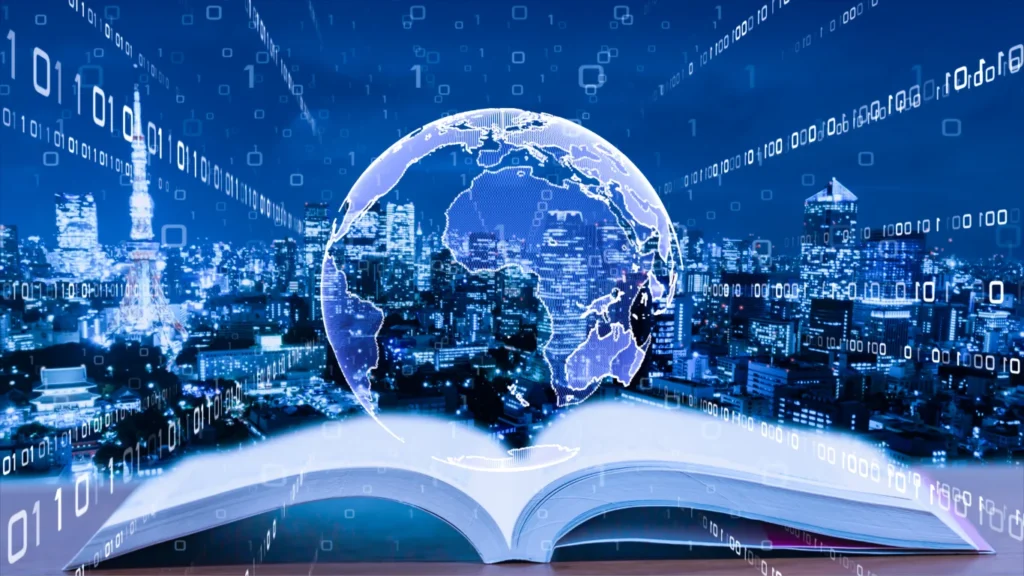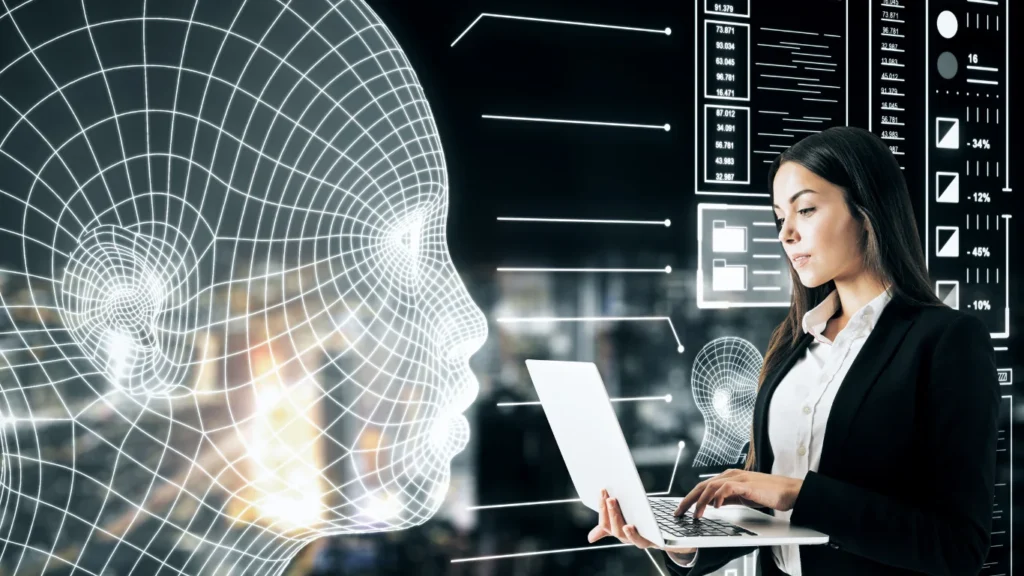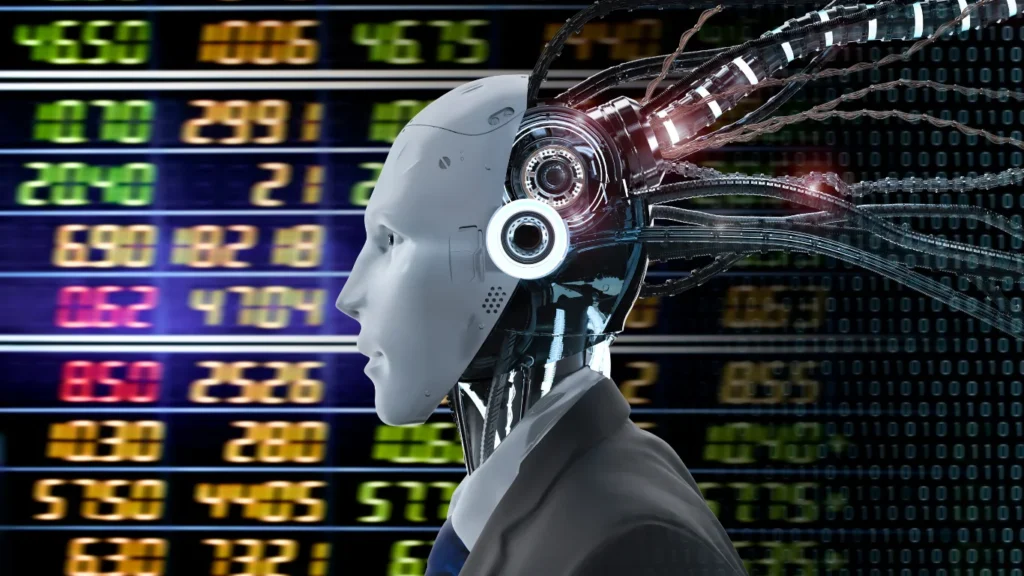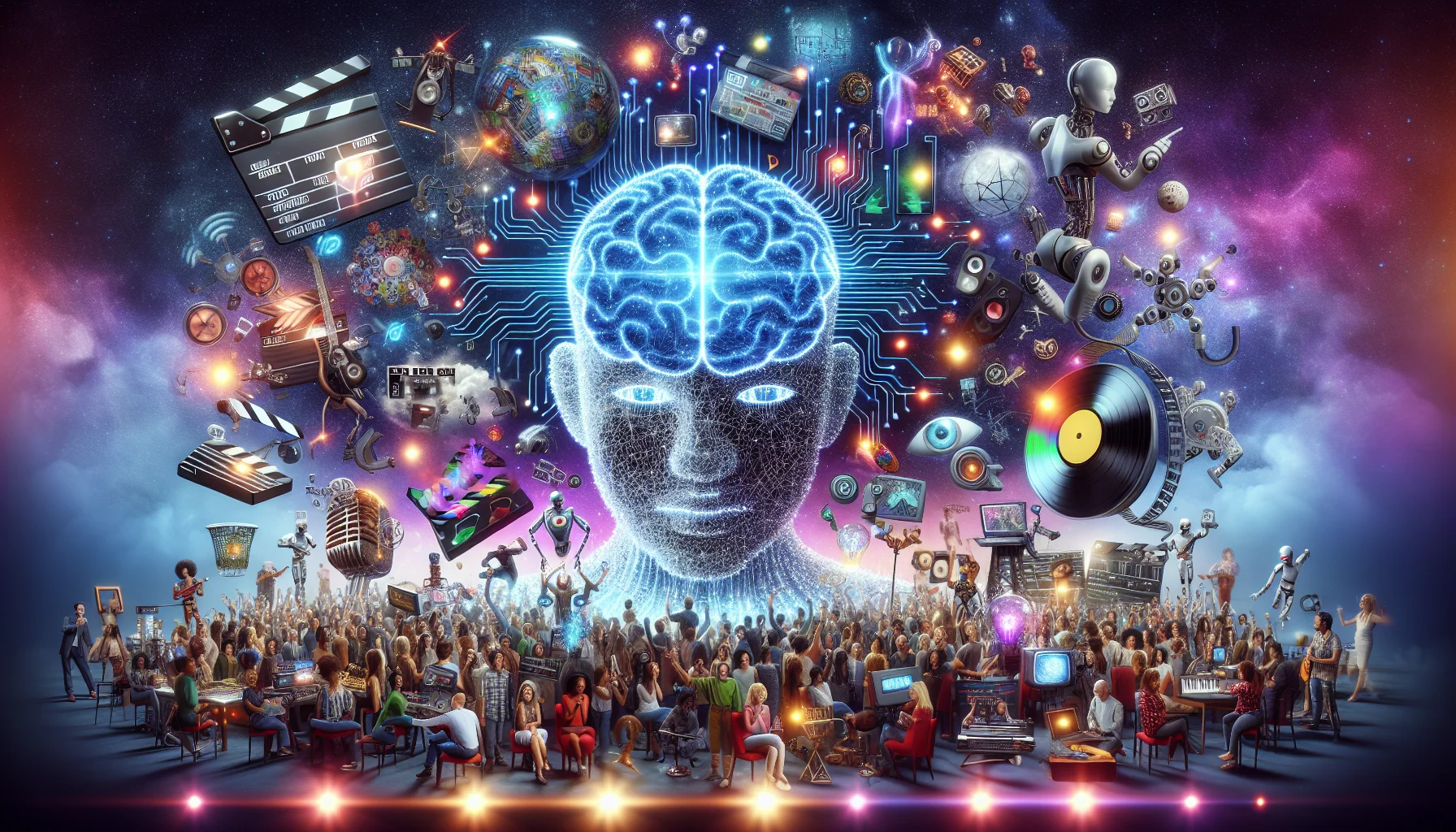Artificial Intelligence (AI) is changing how entertainment is made, distributed, and experienced. AI’s ability to analyse large amounts of data allows for personalised content recommendations that cater to individual preferences. AI can suggest what viewers should watch, making it an essential part of the user experience. This helps to engage users and provide them with recommendations based on their preferences.
AI is also transforming the art world by enhancing and creating art. For example, an AI-generated portrait sold for $432,500 showing that AI-generated art can be valuable. AI-generated music is gaining popularity in various genres, proving that artificial creativity can connect with human listeners.
AI in media is also changing the entertainment industry. Film and game production are becoming more advanced with the help of algorithms.
These algorithms improve the visual and interactive elements, refine editing processes, and bring video game characters to life. This transformation improves the experience for both the consumer and the creator. AI is making significant changes in the entertainment industry, and we can expect more changes in the future.

Timothy A. Clary/Getty Images
Current Applications of AI in Entertainment
Streaming platforms like Netflix and Amazon Prime Video use AI technology to analyse viewers’ preferences. This helps to create personalised recommendations for users, making their viewing experience better. AI identifies the content that is relevant to the user’s interests and recommends it to them. In fact, 80% of the content streamed on Netflix comes from AI-powered recommendations.
AI is also used in the creation of media content, such as video games, film and television. By using AI, content can be generated more efficiently and at a lower cost.
For example, Ubisoft uses AI to generate game content and enhance the gaming experience. AI can also assist with scriptwriting and generate imaginative texts and narratives. However, this new form of content creation has raised questions about intellectual property rights.
The financial implications of AI technology in the entertainment industry are significant. AI can automate the creation of animations, character modelling, and musical compositions that resonate with target audiences. Additionally, AI can generate content that minimises production costs while maximising productivity.
AI in media is also changing marketing and advertising by providing insights that enable custom-tailored marketing campaigns. AI can predict consumer behaviour by analysing social media patterns, leading to higher levels of audience engagement.
In summary, AI technology in the entertainment industry is transforming the way content is created, distributed, and marketed. The industry is projected to grow fast, with a market size of USD 10.87 billion in 2021.

Trends and Future Developments in AI for Entertainment
As technology evolves, the entertainment industry is integrating AI in media in exciting new ways. Advances in machine learning, natural language processing, and computer vision are improving how we create and enjoy content. These technologies will change the way we interact with content.
This trend seeks to provide personalised experiences that match individual preferences with startling precision. Algorithms are no longer limited to recommending products or services. They can now create stories and worlds that resonate with a person’s psyche. These narratives are carefully crafted and designed to speak to the unique needs of each individual.
AI can enhance live events, creating dynamic, interactive spectacles in real time. It’s also paving the way for entirely new forms of entertainment that we may have yet to imagine.
The financial forecast for AI in media and entertainment is optimistic, with the market expected to grow rapidly. Key areas driving this growth include virtual and augmented reality, AI-generated avatars, and engagement analytics, content moderation, automated live broadcasting, and deepfake detection.
However, AI in media also poses some challenges. The use of AI in various sectors presents an excellent opportunity for investment. Before implementing artificial intelligence, it is essential to consider the challenges it poses. These challenges include the cost of implementation, data privacy, job loss, and ethical issues related to deepfakes.
To fully benefit from the opportunities that AI has to offer, it is essential to address these challenges. We need to be aware of the challenges that come with AI’s potential to transform different industries. By doing so, we can make the most of this technology.
Benefits and Drawbacks of AI in Entertainment
As Artificial Intelligence (AI) becomes increasingly integrated into the entertainment industry, a range of pros and cons emerge. On one hand, AI allows for groundbreaking efficiencies and unique experiences. Intelligent algorithms do many things, like making scenes, composing music, saving money, speeding up production, and changing industries. Additionally, AI in media has delivered unprecedented personalisation, tailoring content to individual tastes and transforming passive viewing into an interactive relationship between media platforms and consumers.
However, AI’s rise to prominence also brings with it some issues. As AI-generated content and human originality become less recognisable, ethical concerns arise about the implications for the future. Data privacy concerns, as well as potential biases ingrained within algorithms, underscore the need for responsible AI deployment. Here are some key considerations:
Ethical Implications:
- The need for more originality in art and storytelling may lead to cultural problems.
- There may be potential cultural appropriation by AI without human nuances.
Creative Ownership and Social Impact:
- The influence of AI in shaping narratives could impact societal values and experiences.
- Who holds the creative reins when AI generates a piece of content?
Legal Challenges:
- Protecting intellectual property when AI is involved in the creative process presents new legal complexities.
- Determining copyright liability for AI-created works requires robust legal frameworks.
On the other hand, AI in media has also sparked a shift in user engagement. Personalised recommendations have been proven to enhance satisfaction and viewership. However, this convenience raises concerns over decreased physical activity and potential mental health effects from increased screen time.
Furthermore, with increased automation comes anxiety over job security within the creative industry. Screenwriters, visual effects artists, and others are still determining if AI will go from assistant to creator in the future.
In the matrix of content consumption and production, AI in media represents a double-edged sword. Its transformative potential unfurls across realms like VR/AR and personal avatars, offering experiences that were once mere imagination. The technology can moderate content, automate live broadcasting, and curate media archives, promising a new media landscape. However, as deepfake technology advances, the industry braces itself with sophisticated AI detection tools to counteract potential malevolent uses of this double-edged innovation.
In summary, AI in entertainment is a balancing act that the industry must approach with caution. It requires a judicious use of technology that harnesses AI’s vast capabilities while confronting the profound implications on creativity, jobs, and legalities. As AI becomes more prevalent in entertainment, we need to find a balance. We should use AI’s strengths to enhance and protect the artistic and human aspects of entertainment.

Case Studies: AI in Media In Action
AI technology has had a significant impact on the entertainment industry. For example, Ubisoft uses AI in video game development to create diverse game environments. This technique, called procedural generation, adapts and evolves the game environments, providing unique experiences for players. For instance, the game “Ghost Recon Wildlands” uses AI to manage non-playable characters (NPCs), ecosystems, and events, adding depth to the gameplay and narrative.
Startups like Amper Music use AI to create music that matches different moods and genres in the music industry. This technology makes it possible for content creators to produce soundtracks and musical scores efficiently, even under tight deadlines. This can democratise music production and give human artists more time to focus on creative needs.
Streaming services like Netflix and Amazon Prime Video also use AI to optimise the viewer experience. Netflix’s AI analyses video shots. It compresses content to ensure smooth streaming.
The streaming adjusts to internet speed and device capabilities. It does all this without compromising quality.
Amazon Prime Video uses AI to improve the viewing experience. It does this by providing contextual information about actors and trivia. This is done through X-Ray for Movies & TV Shows.
Conclusion
Artificial Intelligence, or AI, is transforming the entertainment industry. It’s being used to create everything from virtual reality environments to musical compositions. AI is shaping our culture and changing the way we experience art. It’s even influencing the art itself, as evidenced by the $432,500 price tag for a portrait created by AI.
The use of AI in media is more than just a technological advancement. AI is personalising our experiences and making our interactions with digital media more meaningful. It’s like having your digital concierge curate content that reflects your unique preferences and tastes.
As we move into this AI-driven future, it’s essential to consider the implications of this technology. We must be active participants in shaping how AI integrates with our culture and our ethical values. We should embrace the personalisation that AI offers while also questioning its impact on our lives.
So, let’s take a closer look at how AI is transforming entertainment. Whether we’re streaming music or playing video games, AI is enhancing our experiences in ways we never thought possible. We can contribute to the exciting technology story by actively engaging with the content we consume. Additionally, we can encourage innovation by joining discussions about AI’s role in our cultural heritage.
The future of entertainment is waiting for us. Let’s step into it with open minds and a sense of curiosity.






